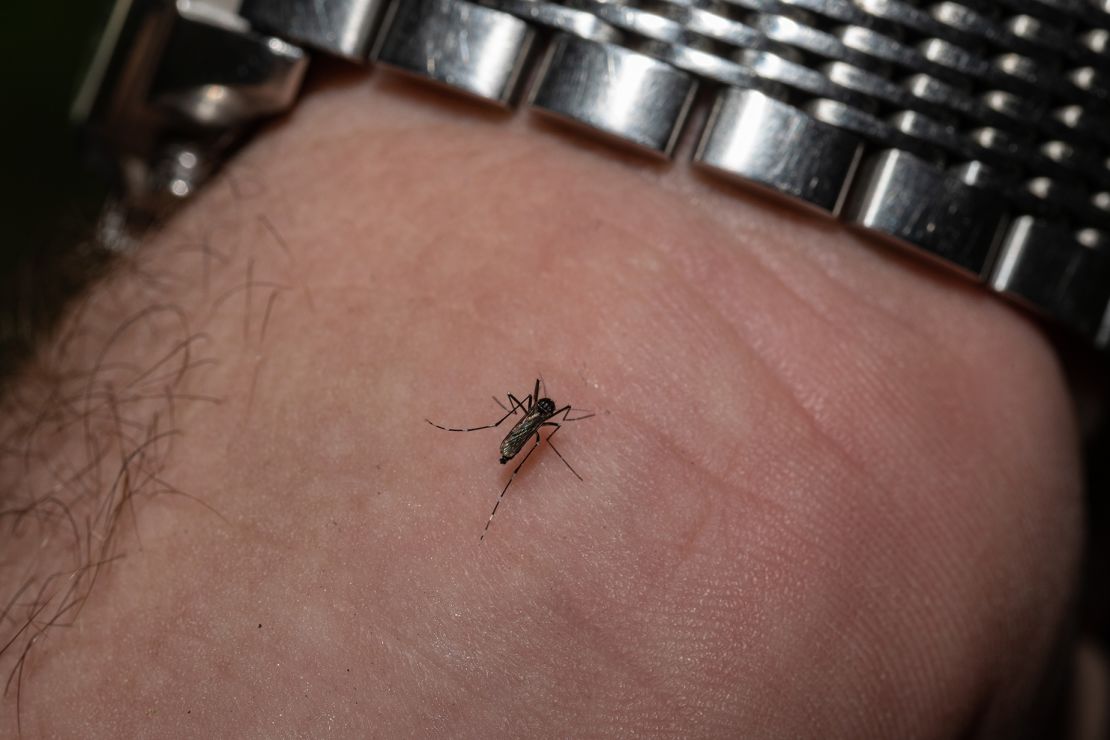West Nile Virus: What You Need to Know About This Mosquito-Borne Disease

CNN
—
When Dr. Anthony Fauci was infected with West Nile virus, a mosquito-borne disease, the illness was so severe that he had to be hospitalized.
Fauci, once America’s top infectious disease expert, is now recovering at home — though he told Stat, the medical and health news site, that it could take “weeks and weeks to get back to normal.”
As summer temperatures persist, I wanted to learn more about West Nile virus: What are the symptoms and why is it so serious? Are there vaccines and treatments? And, as high summer temperatures and mosquito season continue, what can we do to reduce our risk of contracting this and other mosquito-borne diseases?
To answer these questions, I spoke with CNN wellness expert Dr. Leana Wen. Wen is an emergency physician and associate clinical professor at George Washington University. She previously served as Baltimore’s health commissioner.
CNN: What are the symptoms of West Nile virus disease and how serious is it?
Dr. Leana Wen: According to the U.S. Centers for Disease Control and Prevention, West Nile virus is the leading cause of mosquito-borne illness in the continental United States. It is most commonly transmitted through the bite of an infected mosquito. The most common time of year for this disease is during the summer and early fall.
Most people infected with West Nile virus are asymptomatic. Of those who develop symptoms, many have flu-like symptoms such as fever, headache, body aches, swollen lymph nodes, and nausea.
There is a subset of people who develop a neurological form of the disease. (Fauci has said this is not the case.) These cases can involve inflammation and swelling of the brain leading to confusion, seizures, paralysis, coma and death. People with West Nile virus can also suffer long-term neurological consequences.

CNN: How common is West Nile virus?
Magnifying glass: In the United States this year, the CDC reported 33 states with cases of West Nile virus. In 2023, 47 states reported cases of West Nile virus; in total, more than 2,400 cases have been reported, although this is likely a significant undercount given the number of asymptomatic and mildly symptomatic cases.
West Nile virus is also present throughout the world, including Africa, Europe, Asia and the Middle East.
CNN: Can West Nile virus be transmitted from person to person?
Magnifying glass: West Nile virus cannot be transmitted through casual contact with other people who have the disease. Humans are also considered “dead-end hosts,” meaning that a mosquito that bites an infected person will not transmit the virus to another person.
However, cases of transmission by blood transfusion, organ transplantation and, more rarely, from mother to child during pregnancy or breastfeeding have been documented. By far the most common mode of transmission is mosquito bites.
CNN: How is West Nile virus diagnosed? What should someone do if they think they have it?
Magnifying glass: There are blood tests that detect antibodies to West Nile virus, which are used for diagnostic purposes. Patients with the neurological form of the disease may also benefit from a lumbar puncture and cerebrospinal fluid analysis.
People concerned about West Nile virus should consult their health care provider to determine if and how they can seek diagnostic testing.
CNN: Is there a vaccine or treatment for West Nile virus?
Magnifying glass: Unfortunately, there is no vaccine or specific antiviral treatment for West Nile virus. People with the virus receive supportive care to treat their symptoms, but there is no targeted antiviral treatment at this time.
CNN: Besides West Nile virus, are there other mosquito-borne diseases people should be aware of?
Magnifying glass: Dengue fever is another example of a mosquito-borne virus. Most cases in the United States are from travelers, but local transmission has also been reported. People traveling to other parts of the world should be aware of malaria, which can be fatal.
There are also rarer cases of mosquito-borne diseases that can be very serious. For example, Eastern Equine Encephalitis, also known as EEE, was recently reported in Massachusetts. This disease has a mortality rate of about 30%.
CNN: As summer and mosquito season continue, what can people do to reduce their risk of contracting mosquito-borne illnesses?
Magnifying glass: Prevention is key, especially since there is no vaccine or specific treatment for West Nile virus. People with the virus should take these steps during the peak period of West Nile virus, which typically runs from July to September, although cases have also been reported in the continental United States as early as June and as late as October.
First, reduce mosquito bites. Wear long-sleeved shirts and long pants whenever possible, especially when going out at sunrise, sunset, and at night, when mosquitoes are most active. Apply insect repellents registered by the U.S. Environmental Protection Agency to all exposed skin. These products contain active ingredients like DEET. When used as directed, they are safe, including for children and pregnant women. An additional measure is to wear clothing treated with permethrin, which further reduces the risk of mosquito bites.
Second, try to reduce the number of mosquitoes near your home. Install screens on windows and doors, especially between dusk and dawn. Eliminate standing water in your yard and around your home, as these are prime breeding grounds for mosquitoes. Look for objects in your home that can hold water, such as buckets, trash cans, and toys, and empty and wash them at least once a week.
Third, assess your personal risk. If you must travel abroad and go to areas where diseases such as yellow fever and malaria are known to be present, be sure to ask your doctor about additional prophylactic measures to take, such as yellow fever vaccination and antimalarial tablets.
But there are also risks nearby. Fauci said he thought he was bitten by mosquitoes in his backyard in suburban Washington.




